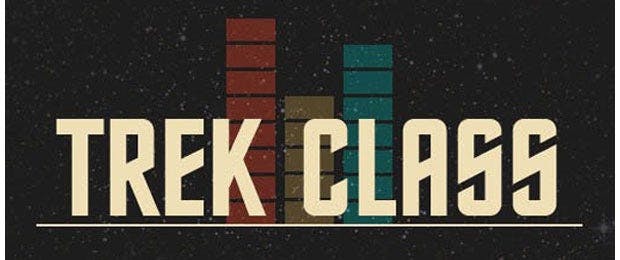
“Trek Class” is a course at Syracuse University’s School of Information Studies more formally titled “Star Trek and the Information Age.” The course examines episodes of Star Trek series as a method of introducing concepts related to technology, society and leadership in our world. This series of posts seeks to share some of the concepts discussed in Trek Class with the StarTrek.com community.A central topic of discussion in Trek Class is the evolution of cultural attitudes toward technology seen throughout the Star Trek franchise. Although Star Trek takes place in the Twenty-third and Twenty-fourth Centuries, the adventures of Captain Kirk, Picard and all that followed were written during our own time and in very different periods. Each series, from the original five-year mission to Voyager’s journey home, embodies the cultural views and concerns popular at the time of its creation.In the TOS episode, "The Ultimate Computer," which first aired in 1968, a breakthrough technology known as the M-5 computer threatens to replace the crew of the Enterprise. Said to be capable of commanding the starship on its own, M-5 is viewed as a dangerous step forward for humanity, putting people out of work and risking the lives of innocents. However, views had changed significantly by the time the TNG episode "The Measure Of A Man" aired in 1989. Here we see an intelligent technology living and working among the crew, and Captain Picard is even willing to argue that Lt. Commander Data may actually be a sentient being.These are two examples among many which highlight our own society’s growing comfort with the technology. However, one depiction of technology adoption found in Star Trek has always seemed a bit too extreme for even the earliest adopters – the Borg. As a race of cybernetic drones linked to a collective mind, the Borg can be considered the ultimate acceptance of technology. With its pursuit of efficiency and perfection at the expense of individuality and personal freedom, the Borg appear to threaten much of what we value in the Twenty-first Century. These concerns are reflected in the views of our Twenty-fourth Century captains. Captain Janeway refers to the Borg as “the Devil” and Captain Picard is quoted as saying, “the Borg are as close to pure evil as any race we've ever encountered.”Still, as we consider the technology surrounding us in our own time – from social networks to mobile devices, medical advancements and biological enhancements – can we still say that the Borg are so unfamiliar? Is it possible that we Twenty-first -Century humans might see the Borg as a little less like M-5 and a little more like ourselves?That was the question presented to Trek Class students in an assignment known as The Locutus Project, for which students were asked to put aside any personal concerns about technology and instead assume the role of Locutus. As Locutus, each student would attempt to argue for the assimilation of the human race.Although this is a creative project with a lot of humor involved, it was clear that many students had identified some strong reasons why we might benefit from assimilation. It was also clear that some of the fears we often associate with technology, such as the loss of jobs to automation or the risk of information overload, were not as common in the minds of these college students as they had once been in our society.In a script written by one student portraying the Borg assimilation of our world, the Borg state, “Thousands of people die from careless fighting over issues that are irrelevant to the Borg… you try to close the distance between people with chat programs, social networking… we provide you with a closeness no human has ever experienced.”Other students imagined the Borg making a business pitch to the people of Earth. In one such case, a student envisions the Borg appealing to our growing addiction to technology, comparing assimilation to our own desire for constant connectivity. The Borg assure humanity that we would never again experience the panic of a dead mobile phone or lost Internet connection. In a slightly different approach, another student presented Borg Assimilation Training, a ten-step program designed to prepare humans for their new lives a drones. Among the benefits listed are access to the most advanced technology and improved collaboration among coworkers.With all the advantages proposed by our student versions of Locutus, the question of individuality still remained a challenge. One student questioned the human desire for individuality in a comic strip portraying a conversation between Locutus and a human. Arguing on behalf of the Borg, he cites the massive revenue and cultural impact of brands like Nike and MTV. He writes, “Individuality is an inappropriate term for defining yourself as everyone else does.”Regardless of how individuality is defined, and how much our socially networked world may seem like the Borg, Trek Class students seem to agree that a fundamental difference between our own technological evolution and that of the Borg is that our collective is strengthened by each person’s unique ideas. In our current state, the students pointed out, we are not replacing our own thought processes with a hive mind. We are exchanging ideas, learning from each other and learning to make better decisions through collaboration. This type of assimilation, a more human approach, seems much less troubling.So maybe students weren’t able to present a winning case for Borg assimilation, but they did raise some compelling ideas about the technological evolution of our collective. It seems that no matter how connected we become or how comfortable with technology, perhaps even within our own bodies, the class agreed that the human pursuit of technological perfection is fueled by a desire to protect our individuality, not to diminish it.---Anthony Rotolo is a professor at the Syracuse University School of Information Studies (iSchool), where he specializes in social media. You can follow along with Trek Class each Tuesday and Thursday at 2:00pm EST on Twitter by using the hashtag #TrekClass.
